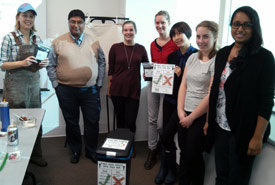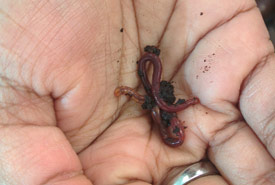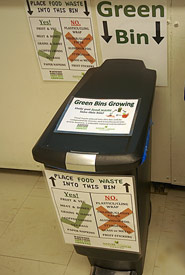Opening a can of worms for greener possibilities

Owner of WasteNot Worm Farms gives NCC staff the 101 on worm composting over a lunch and learn in Toronto (Photo by Jocelyn Molyneux)
I have a nine-to-five job, spending most of my day in front of the computer and far removed from any Nature Conservancy of Canada (NCC) property. I will likely not be doing hands-on conservation on any given work day. Sometimes, cubicle dwellers like me need to think hard about how we can contribute in environmentally positive ways in our workplace.
Recently, the NCC national office in Toronto opened a can of worms in hopes of closing the loop with our organic wastes. Up until November 2015, there had been no organic waste collection in our building. That all changed when a vermiculture start-up contacted NCC about composting our food waste through Green Bins Growing.
Owner and operator of WasteNot Worm Farms, Jocelyn Molyneux, is just about the most enthusiastic person I’ve seen about red, wriggly worms. Over a lunch and learn, Jocelyn introduced our group to the important roles worms play in agriculture, the differences between traditional (hot) composting and worm composting and their fertilizer by-products. Of about a dozen attendees, only one had experience with worm composting and that was from the college she attended that had adopted this practice.
So what’s the point of all this, and is it worth it?
Worms are the soil’s natural nutrient recycling squad and they are quite apt at this job. They eat decaying matter and produce nutrient-rich biofertilizer. By signing on for an office worm composting system, we’re looking to divert our organic waste away from landfill to a process that feeds back into our food system.
Jocelyn told us one pound of worms can eat up to one pound of food waste each day. The resulting manure material is called worm castings — a dense, nutrient-rich humus that sequesters carbons, feeds soil with beneficial microbes that kick-start the soil food web and provides natural plant growth stimulators.
Compare this to conventional fertilizers, which are generally made from petroleum products: conventional fertilizers damage the natural soil ecosystem, reducing soil fertility by killing soil microbes and creating a dependency on further chemical fertilizer applications. Check out this fertilizer buying guide published by National Geographic.
Even when compared to traditional composting, worms come out on top. “Traditional composting produces a low-grade soil mulch where the high heat treatment has killed most beneficial microbes and much of the carbon and other nutrients have broken down,” Jocelyn says.
The price difference is telling, too. Worm castings weigh in at $400 U.S./cubic yard versus $30 U.S./cubic yard for compost.
A big incentive with WasteNot Worm Farm is that we receive 25 percent of our year’s castings to give out to employees or donate to a community garden. A good deal, compared to buying it at $5/lb, if you ask me!
Meeting our worms

Red wigglers are small but have a big appetite (Photo by NCC)
After receiving the 101 on worm composting, we had the chance to introduce ourselves to the red wigglers we had just employed. To our surprise, these are thin, spindly worms about two to four inches long; nothing like the big plump earthworms (night crawlers) some of us encounter while working in our gardens.
A brave few held their hand out to “meet” the worms, but were told not to handle them for too long as worms are photosensitive and can go into spasms under prolonged exposure to light.
We will not however actually have a worm bin in our kitchen, and for good reason! WasteNot Worm Farms collects our food wastes weekly, reducing the risk of fruit flies and limiting the waft of bad odours. Composting at a central farm facility (about 80 kilometres outside of Toronto) is more efficient for a small operation like WasteNot Worm Farms. Like the worms themselves, WasteNot Worm Farms is small but has a big appetite.
Ontario sends three million tonnes of organics to landfill each year, mostly because it's cheaper to landfill in Michigan than it is to compost in Ontario.
“Canadians are hungry for sustainable solutions, and worm farming is a simple, inexpensive biotechnology that recycles waste nutrients back to our soil. With early adopters like the Nature Conservancy of Canada leading the way, I'm confident that vermicomposting is on the verge of becoming a popular Zero Waste industrial recycling solution,” says Jocelyn.
Trashing out then and now

There is no mistaking what goes in our green bin with all this signage! (Photo by NCC)
It has now been two months since we started using the green bins and I can already see a drastic diversion of wastes. In the past without organic waste collection services, we had no choice but to dump our food scraps into the same bin as our non-recyclables. Since we signed on with WasteNot Worm Farms, our staff have been diligent in correctly sorting their organic, compostable items, recyclables and trash.
Our hope is that by paying a small premium for Green Bins Growing, we are supporting a waste management practice that promotes environmental sustainability. We are looking forward to seeing the volume of worm castings our wastes can generate over the year, ensuring we’re doing our part to cycle those nutrients back into our soil.


